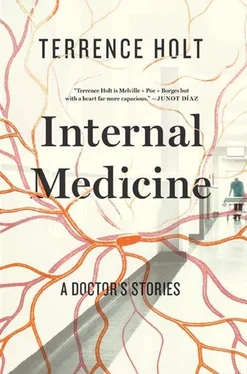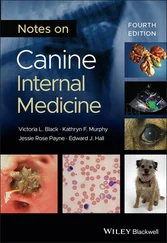In the morning, after rounds, after another sleepless night, I went in to shut off Marie’s dobutamine. Her pressure had started drifting down, but otherwise there had been no change. The whole family had gathered again at the bedside, joined by a few more faces that shared the stamp of Marie’s pointed chin and broad forehead. There was also a large, freshly bathed and shaved figure introduced as the pastor. It was time.
I went to the head of the bed. Marie looked up at me. “Hello, Doctor,” she said.
“How are you?” I asked, the question sounding less inane than I expected it would.
She waved a hand vaguely. “Here,” she gasped, attempting a laugh, and then the hand subsided.
“I’m going to turn off the dobutamine now. Is that all right?”
“Yes. Turn it off.” She almost rose from the bed with a sudden vehemence that startled me.
“Are you sure?” I asked reflexively.
“Yes.” Her voice rose sharply. “Turn it off. Now!” With her left arm she gripped my sleeve. “You promised.”
She was wandering, I thought, addled by morphine and fatigue, drifting in and out of a place she did not trust. I only nodded, and turned to the nurse who had quietly followed me in. She bent beside the IV pole. The pump sighed to a halt, the grinding noise that had been unnoticeable up until then suddenly loud in its absence.
Nothing changed. The family stood still, looking at Marie as if they expected her to expire on the spot.
I moved back to the bed. “There,” I said.
She looked at me.
“Are you okay?” I smoothed a curl back from her forehead.
“Fine now,” she said. And then her right arm reached around and gripped my shoulder, pulling me toward her. I bent, obediently, thinking she wanted to say something.
Instead she planted a dry kiss on my cheek. I hung there a moment, holding my breath. Then I kissed her back. The skin of her cheek was very cool. She sighed, and her grip relaxed. I turned and left the room.
It took Marie four hours to die. I was in and out of the room, checking for signs of distress. There were none. On one of those visits, I reached up and turned off the bedside monitor: she had a pacemaker, and I didn’t want the family to see the tracings continue after she was dead.
Around three-thirty, the nurse found me at the station.
“Twelve is gone.”
I sighed, and pulled myself upright.
MARIE’S BODY: THE FACE gone slack and chalky, the eyes blank; her lips, half open, expressionless. Within her chest I heard nothing. A fugitive creak and gurgle as fluids shifted in her, but the heart itself was still. Time of death was 3:32. Cause of death, congestive heart failure. I filled out the papers as quickly as I could.
“DOCTOR?”
I looked up, focusing with difficulty. It was Jeanine. Her eyes were red, mascara smeared across both cheeks.
“Marie wanted me to tell you.”
“What?”
“Two things. She said to thank you. And that she knows where that ice-cream cone went.”
I waited.
She shook her head. “That was all she said. ‘Tell that doctor I know where the ice cream went.’”
I looked at her and she shrugged, smiling.
I smiled back and we parted, hugging each other in the decorous way strangers should.
LATER THAT DAY, FINALLY, I went home. I lay awake a long time that night, in the desperate insomnia that seizes me sometimes, post-call. I was thinking about that ice-cream cone, wondering what Marie had meant, what revelation had come to her as her brain, starved for oxygen, fogged with drugs, had started to shut down. I have seen it before. My own father, dying on a morphine drip, his kidneys gone from a failed dobutamine tune-up, had spoken in his last coma. Stray words. Words I hung on through the long afternoons. I no longer remember them.
Where could that ice-cream cone have gone? It had fallen somewhere they hadn’t thought to look. Everybody in the room, all of them sharing that story over all those years, must have known it. That wasn’t the point, though. But then what was? I tortured the question for a long time, as my wife stirred beside me in her sleep, and one of the children murmured something over the carrier hum of the baby monitor, and nothing came to me. Just ice cream, Marie’s finale, the long slide downward into night.
That night I dreamed. I have found that picture. Deep in it, the figures move, the three little girls in their neat white dresses throwing up their arms and shrieking silently as the wind whirls, leaves and debris fly around them, and in the distance trees thrash their limbs against a glaring sky. I scan the picture, searching it for a dim white blur ascending, flying skyward out of the frame. That night and three times since I have dreamt this, and each time I awake into the dull non-knowledge that I have failed to find the ice cream. I know that one day in this dream I will learn where the ice cream has gone, where Marie has gone, where all of us will someday vanish, ice under the sun. Unaware that this is but the dream still upon me, I watch helplessly as it recedes into the light, whirled upward on a wind that leaves me cold and dark and dumb.
THE REFERRAL HAD COME IN THE DAY BEFORE. Richard, the on-call nurse, had jotted down a sketchy story: Sylvia Turner, a fifty-seven-year-old woman being discharged from Memorial after treatment for a sinus infection. I looked up from the form at the duty nurse with whom I was rounding that morning. “Sinus infection?” I said. “Is that really an indication for hospice?”
Linda laughed. “Is that what he wrote down? Give me that.” She took the referral from my hand and swiveled it around. “That idiot.” She laughed. “He left out the part about the cancer. Squamous,” she added, and tapped the side of her nose.
“Ah,” I said, meaning I was sorry for Mrs. Turner. Like leprosy, only worse, runaway squamous-cell cancer whittles its victims away until the tumor reaches something vital to life, and then they die. “Anything else about her?”
“Husband says she’s stopped eating.”
“Is that a problem?” I asked. With hospice patients, when they stop eating it’s usually a good thing.
Linda shrugged. “That’s where Richard ran out of info. She’s first on the list, however,” she added brightly. “Shall we go ask her?” She hoisted her red backpack and stomped out the door. Linda, I had learned, despite the impression she gave of having spent the weekend playing electric guitar in a goth band, was a highly reliable if somewhat profane nurse. In my four days so far with the hospice team I had also learned to follow her obediently from house to house.
My presence on the hospice service was an elective month, one of two my residency program permitted. Hospice had looked promising because: (a) it got me out of the hospital, and (b) I didn’t have to come in on weekends. And, I had told myself, it would be a relief to work with patients whose deaths were welcome.
I spent the drive in a pleasant half doze as Linda drove. I suppose if I’d paid attention to her driving I’d have been less relaxed, but in this, as with her dispensing of morphine and laxatives, I was content to let her steer.
I know now that much of this passivity was simply evasion. It hadn’t taken many visits to homes where death had become part of the décor before I started to think that in electing a month of hospice I’d possibly overdone it. But it was only a month, I told myself; if I had learned nothing else from residency so far, it was that I could do anything for a month. So I did what I’d learned to do very early on in my training: pull in the antennae, lean back, and watch the scenery go by.
Читать дальше













